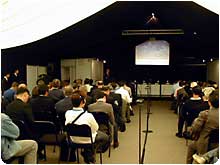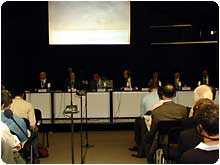Japan's Challenge for Kyoto Protocol Implementation
 |
 |
The Ministry of the Environment, Japan, and the Institute for Global Environmental Strategies (IGES) hosted a seminar titled "Japan's Challenge for the Implementation of the Kyoto Protocol." The seminar was held on August 28th from 1:30 to 3:30 p.m. in the Japan Pavilion in Ubuntu Village.
Japan, the chair country of COP3, ratified the Kyoto Protocol this June. This ratification is an important milestone in Japan's environmental policies. In relation to the Kyoto Protocol, some concerns, such as "Is the Protocol really effective without large emitters' participation?" or "What if the Protocol will hurt the economy?" have been expressed. However, greenhouse gases emissions are increasing continuously on a global scale and the Kyoto Protocol is the first step in tackling global warming. Unless we take this first step, we could miss the chance to address climate change.
Japan is determined to take this step from the perspective that the environmental goals can and should be reached without hurting the economy. It will not be an easy task for Japan to achieve its six percent reduction target under the Protocol. In this seminar, Japan's efforts to satisfy its Kyoto target, regardless of its high energy-efficiency, were presented. These efforts will result in boosting the economy and creating new employment through scientific and technological innovation and through assertive, forward-looking actions in the business sector.
However, we should recall that the Kyoto Protocol is only an important first step. Our goal is to achieve the objective of the Framework Convention on Climate Change, which is the stabilization of GHG concentrations in the atmosphere at a level that would prevent dangerous anthropogenic interference with the climate system. To this end, all countries must cooperate with each other. Hence, we need to establish the post-Kyoto regime. In this seminar, active discussion on the post-Kyoto regime was explored and the approaches for proceeding on this point were discussed.
The participants included government officials, researchers, business people, and environmental NGOs from both developed and developing countries. The discussion will surely bring out new ideas and enrich participants long-term climate change policy development options.
Back to Index
